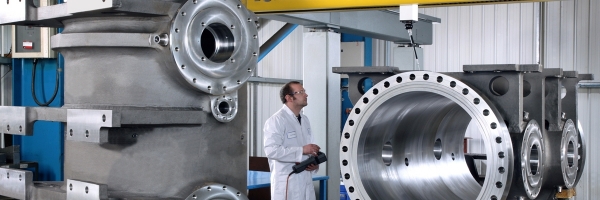VERICUT proves vital for Goodwin International’s risk management
Located just a stone’s throw away from where the company was established in Stoke-on-Trent around 130 years ago, Goodwin International carries out precision machining services for the Goodwin Group. From cast stock the company fully machines and assembles a range of valves, heavy duty submersible slurry pumps, power generation components, and provides specialist heavy engineering services for nuclear and civil engineering projects. Here, CGTech’s advanced NC simulation and optimisation software, VERICUT, is a fundamental element in the company’s risk management strategy.
Goodwin International produces the most technically advanced pressure operated valves available for severe and critical duties. “We have been a leading supplier to the hydrocarbon, energy and process industries for over 20 years and the growth of the company has been fuelled by that business” explains Lead Programmer in Tooling and Development, Simon Ault.
As well as the growth from its established valve markets, Goodwin International has also diversified into specialist high end machining projects, including large suspension bridge structures, nuclear components, and power generation systems. Simon Ault recalls: “Our expansion escalated when we were awarded contracts from the Chinese power industry, to support its own phenomenal growth. We expanded our facility with new machine bays and set about installing the machine tools to meet the demand for our services. We invested wisely and now have the technologies and state-of-the-art machine tools capable of accommodating workpieces up to 50 tons.”
Machining components from low carbon steels, alloy steels, stainless steels, super duplex and heat resistant super alloys, with the volume of the production increasing, and the size and value of the special project work growing, the company faced a challenge to its business.
Simon Ault explains: “The high integrity castings provided by Goodwin Steel Castings arrive at this facility with very high value due to the alloy type, its size, and the complexity of product we’re capable of manufacturing, so we simply had to have zero tolerance to any errors in the manufacture of these units. The value is representative of the risk level in context of its manufacturing, and we needed to update our risk management strategies.”
The company has invested in many high end 3D technologies to support its manufacturing position but it was a particular project that highlighted how they could significantly enhance the security of their machining processes. Due to previous limitations, they outsourced a highly complex programming job, VERICUT was used by the outsourced CAM provider, and discussions with CGTech’s Senior Sales Engineer, Rob Lightfoot, resulted in the simulation and verification software being used to eliminate the risk on a project that used the most advanced machining operations that the company had undertaken. The power of VERICUT software was demonstrated and subsequently this technology, coupled with Siemens NX CAM software, was brought in-house.
Simon Ault states: “Updating and supplementing our suite of 3D technologies for enhanced capabilities and visualisation was fundamental to managing the risk of machining high value products, now, its success is driving the move to shop-wide application.
“With advanced programming tools we need to be certain that the information sent to the machine tool is correct, that the code will work in the way we intend, produce the right component and not foul or damage anything.”
For Goodwin, NC code can come from several sources. It can be exported from the CAM system, hand-written, or supplied by third party applications. As Simon Ault points out, you bring code in but do you trust that code? “To manage the risk, we must check all of that code regardless of its source. We use highly customised post processors for our advanced CNC machine tools, but we also convert standard code into macro format to deliver flexibility where it’s needed.”
He continues: “We push our machine tool capabilities, machining super alloy complex topography components with custom-made tooling solutions. We do get errors during programming, we’re not totally immune, but it’s a priority to catch them before they get to the machine tool thus avoiding any financial and material wastage. And, laser scanning provides us with an intimate knowledge of our stock component’s topography.”
Data is reverse engineered to CAD model format, which when coupled with the related work holding, custom tooling, manufacturing stage models, and highly tailored tool paths, allows the whole physical environment to be visualised.
“VERICUT allows us to do that. It’s the solution that pulls it all together, in a virtual machining environment. We are not just simulating the cutting action of the tool; we are removing any ambiguity of the processes used to produce the part,” Simon Ault confirms.
Using bespoke multi-axis machines and complex tooling regularly means the operator is unable to see the machining operation. “How do we work blind and ensure that the component is machined correctly? VERICUT simulation provides the answer before executing a program, it increases user confidence, and ensures minimal stops to production, increasing efficiency while also maintaining accuracy,” he says. “It allows checks to be made as part of our concept of removing each of the items of risk.”
He concludes: “The ability to machine in a virtual world certainly enhances our risk management. The production departments can now hand, to the shopfloor, a complete manufacturing process rather than just a stream of cutting data. The successful use of VERICUT for several high value projects over the past years, where the machining based risk has been virtually eliminated, drives us on to deliver this security across the entire shopfloor.”
 Germany
Germany Italy
Italy USA
USA South Korea
South Korea UK
UK India
India France
France China
China Japan
Japan
